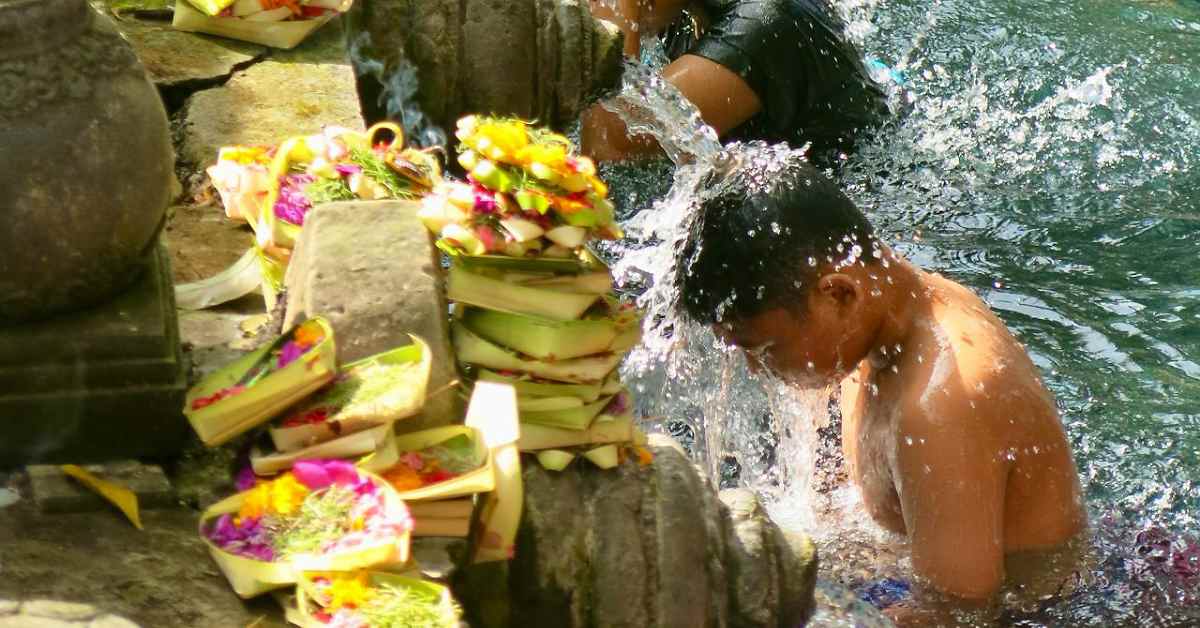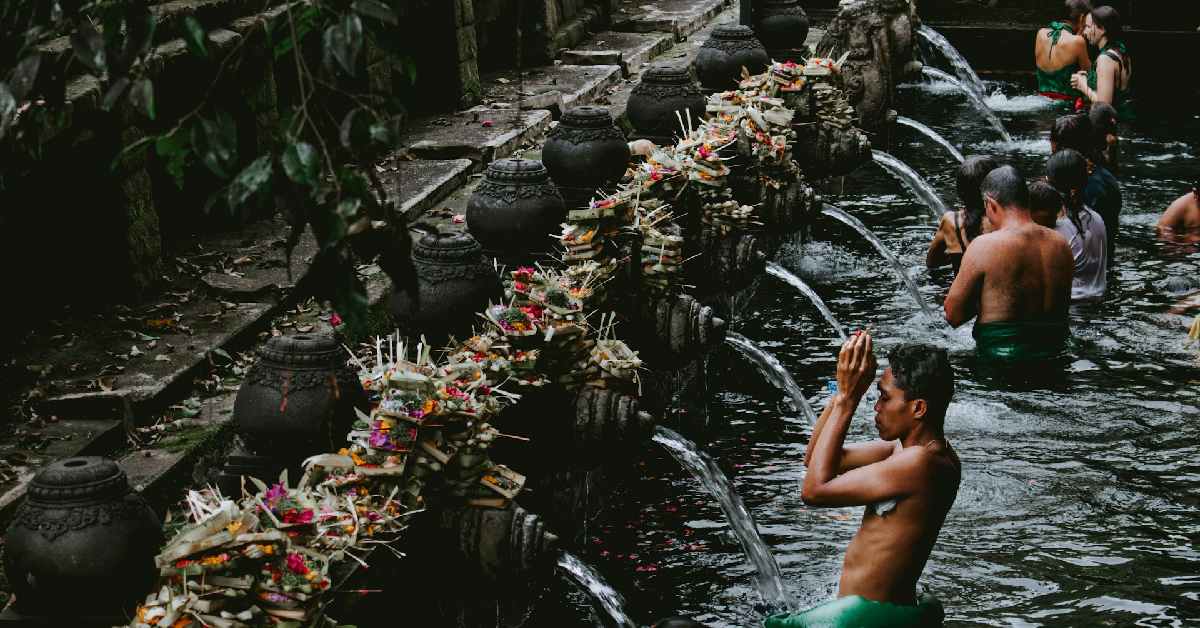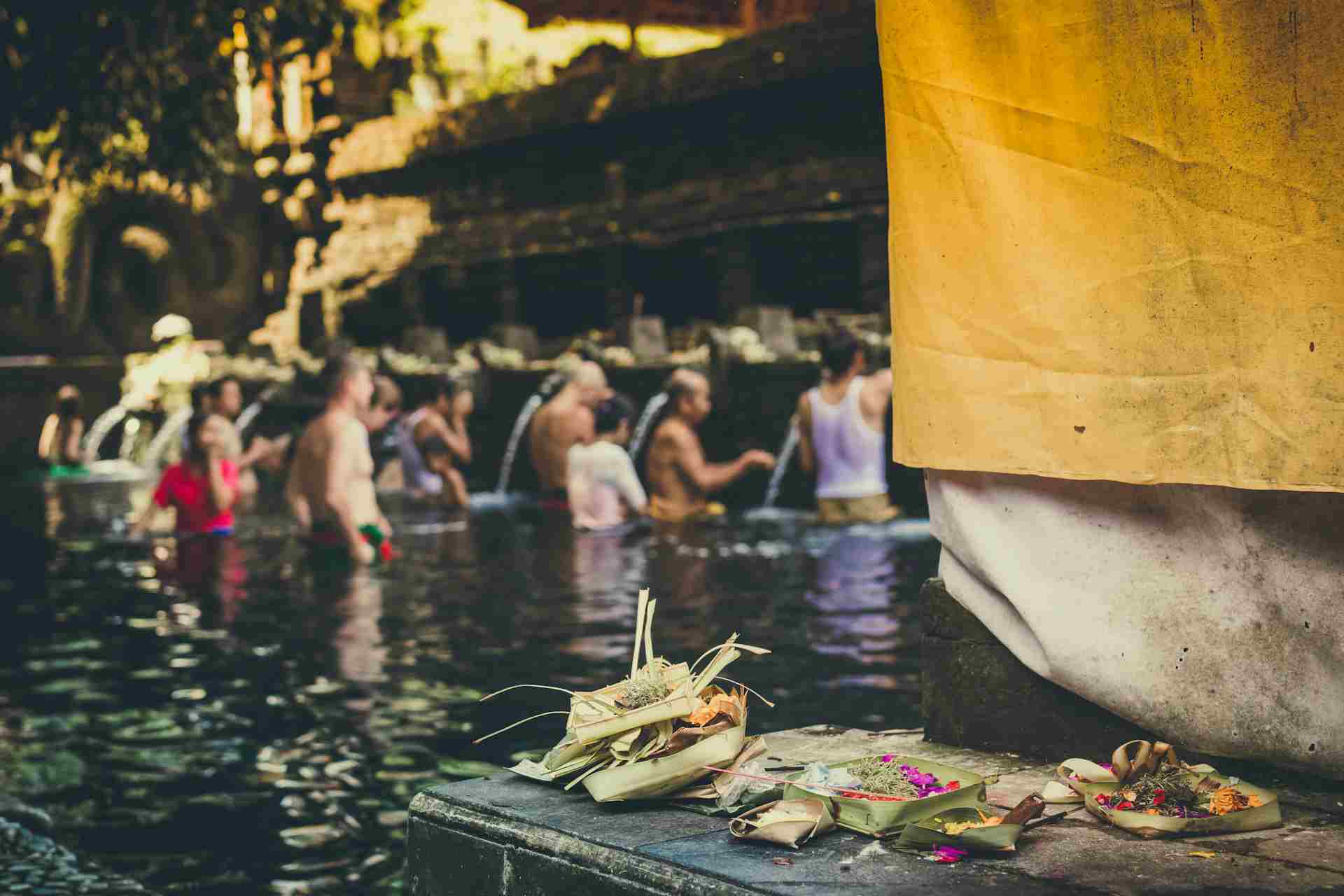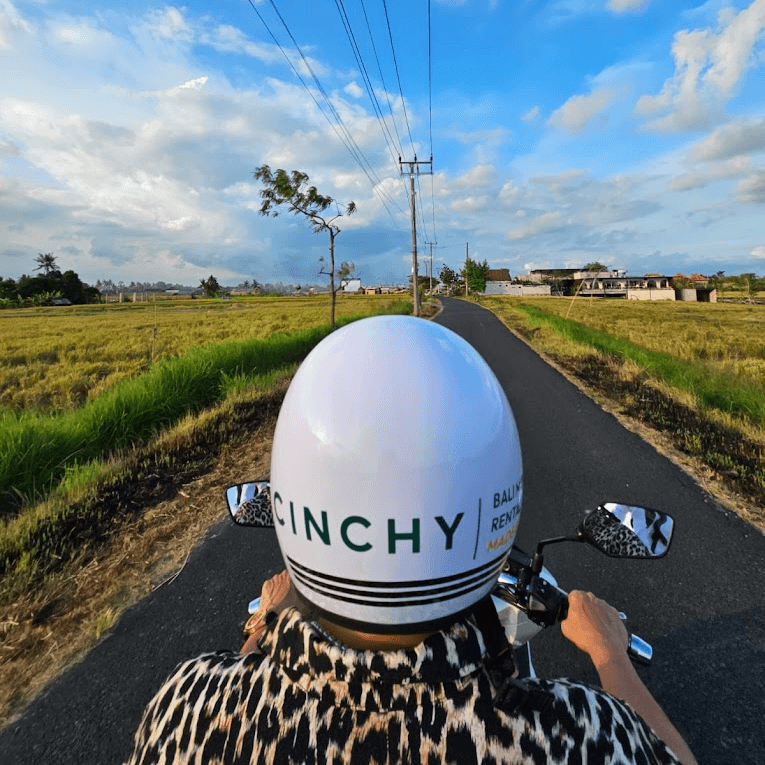scroll for more! ⟶
Cinchy Blog / What is Melukat (Water Purification Ritual) in Bali?
What is Melukat (Water Purification Ritual) in Bali?
Published: 07 Aug 2025
By Syahrial Maulana Sudarto
Travel Enthusiast

Book Your Ride in Just 1 Minute!
Free Cancellation
24/7 Support
Insurance
Start Date - End Date
Start Time
End Time
Duration
0 Day(s)
Have you ever felt the need for a spiritual reset or a deep inner cleansing?
Traveling to Bali offers more than just stunning beaches and vibrant nightlife; it provides a unique opportunity to connect with an ancient culture and its profound spiritual practices.
One of the most sought-after experiences is the melukat ceremony, a powerful water purification ritual that has been a cornerstone of Balinese life for centuries.
This article will serve as your comprehensive guide to understanding what is melukat. We’ll cover everything you need to know, from its spiritual meaning to a step-by-step guide, and even how to get to these sacred locations easily.
What is Melukat? The Balinese Spiritual Cleansing
At its core, melukat is a sacred ceremony of purification rooted in Balinese Hinduism. The word "melukat" comes from the Old Javanese word lukat, which means "to purify" or "to let go."
This ritual is a way for people to cleanse their bodies, minds, and souls from negative energy, past traumas, or even bad karma.
The foundation of melukat lies in the belief of Agama Tirta (the religion of holy water), which views water as a life-giving, sacred element.
It is believed that water acts as a medium to connect humans with the gods, especially Lord Vishnu, the preserver of the universe.
The most beautiful thing about melukat is its universal nature. While it’s a central practice in Balinese culture, it is open to everyone—local and tourist, Hindu and non-Hindu alike.
You don't need to convert or belong to any specific faith to participate. It's a deeply personal ritual, often done individually or in small groups, focusing on self-cleansing and personal rejuvenation rather than a community-wide ceremony.
The ritual uses holy water (tirta) sourced from natural springs, rivers, or the sea. This water is blessed by a priest or pemangku through prayers, transforming it into a powerful tool for spiritual purification.
The Spiritual Purpose Behind the Ritual

Participating in a melukat ceremony is much more than just taking a bath. It is a profound spiritual journey with a deeper meaning.
Restoring Balance: The ritual aims to neutralize negative energy, known as leteh. This can include stress, bad luck, or the effects of black magic. By cleansing oneself, you restore balance between your inner self and the universe, in line with the philosophy of Rwa Bhineda, the duality of good versus evil.
Unity with Nature: Melukat embodies the core Balinese philosophy of Tri Hita Karana—the harmony between humans, God, and nature. By using water as a gift from nature, the ritual reminds us of our interconnectedness with the natural world.
Spiritual Transitions: Locals often perform melukat before important life events like a wedding or graduation. It’s also a common practice on holy days such as Purnama (full moon) and Kajeng Kliwon (a day believed to have strong spiritual energy), marking a new spiritual beginning.
Psychological Benefits: Beyond its spiritual aspects, melukat offers significant psychological benefits. The ceremony provides a safe space for the release of pent-up emotions, helping you find inner peace and clarity about your life's purpose. Many participants report feeling "lighter" or experiencing an emotional release, such as crying, as a result of the cleansing process.
How to Prepare for a Melukat Ceremony
To get the most out of your experience, both physical and mental preparation are crucial.
1. Dress Code
You are required to wear traditional attire—a sarong (kain) and a sash (selendang). Don't worry if you don't have one; these are typically available for rent at the temple for a small fee (around IDR 10,000–20,000). A gentle reminder: women who are menstruating are asked not to participate, as they are considered ritually impure.
2. Self-Preparation
It’s best to avoid alcohol and heavy meals before the ritual. This helps you maintain a clear mind and focus on the spiritual journey. You should also bring a simple offering called canang sari, a small basket woven from palm leaves and filled with flowers, fruits, and incense. These are a symbol of gratitude and can be easily purchased from vendors near the temples for around IDR 10,000–20,000.
3. Set Your Intention
Before you begin, spend a moment reflecting on why you are here. Is it for healing, a new beginning, or to let go of a past burden? Holding this intention in your mind throughout the ceremony will make the experience more meaningful.
It's also important to note that if you have a pre-existing medical condition like a heart condition or epilepsy, you should consult with a doctor, as the ritual involves prolonged contact with cold water and intense meditation.
Read Also:
How Much Does the Melukat Ceremony Cost?
Bali Temple Etiquette: A Guide for Visitors
What is Canang Sari, History, and Its Function
4 Temples in Seminyak Bali for Cultural Visit
A Step-by-Step Guide to the Melukat Process

The melukat process is often guided by a priest (pemangku), but it can vary slightly depending on the location. Here’s a general overview of what you can expect during the sacred ceremony:
Opening and Offerings: The ceremony begins with the priest leading the prayers at an altar. You'll be asked to light incense and present your canang sari as an act of gratitude. The priest will then sprinkle you with tirta (holy water) to start the cleansing.
Cleansing with Water: Participants enter the sacred pool or stand under a series of holy water spouts. The process typically involves washing your face three times, drinking the holy water three times, and then submerging yourself under each spout three times. The number three is significant, symbolizing balance. In more natural locations like waterfalls or rivers, you might be asked to sit or stand directly under the flowing water.
Meditation and Final Blessing: After the water ritual, the priest will place grains of blessed rice (bija) on your forehead as a symbol of protection. This is often accompanied by a final prayer and blessing.
Post-Ritual Reflection: After changing into dry clothes, you might have a brief talk with the priest, who may offer spiritual advice. Many people find themselves overwhelmed with emotions during this part, which is a natural part of the cleansing the soul process.
The entire ritual usually takes about 1-2 hours, leaving you with a feeling of deep peace and rejuvenation.
Where to Experience Melukat in Bali
While many villages in Bali have their own sacred springs, some locations are more famous and accessible for tourists.
Here are some of the most recommended spots for melukat:
Pura Tirta Empul (Gianyar): This is arguably the most famous and popular temple for melukat. With a beautiful 10th-century stone pool and 30 holy spouts, it offers a well-structured experience. It can be crowded, but the energy is truly incredible. Entry Fee: IDR 75,000.
Sebatu Holy Spring (Tegallalang): For a more intimate and less crowded experience, Sebatu is a great alternative. It’s surrounded by lush forests and small waterfalls, making it a favorite for couples seeking a more private moment of purification.
Pura Mengening (Tampaksiring): Located near Tirta Empul but much quieter, this temple offers a tranquil atmosphere with 12 sacred spouts. Entry Fee: IDR 30,000.
Pura Gunung Kawi Sebatu: An 11th-century temple complex that requires you to descend about 300 steps. It features a beautiful fish pond and a serene atmosphere, perfect for those who want to avoid the crowds. Entry Fee: IDR 30,000.
If you want to find out other places in Bali to do melukat, you can read here: 7 Best Places to Do Melukat in Bali.
Riding to Melukat Places Easily and Comfy with a Scooter from Cinchy!

Explore Bali with scooter
As you plan your journey to these spiritual sites, Cinchy is here to help.
Our well-maintained and safe scooters, including the Comfort scooter category with Yamaha NMAX and Honda PCX that are suitable for long rides, are regularly serviced to ensure your safety and provide a smooth ride to even the most remote temples.
Why choose Cinchy for your Bali adventure?
Competitive Prices: Our daily, weekly, and monthly packages are incredibly budget-friendly. You can rent a scooter from our Comfort category starting from just IDR 155,000/day (~US$9).
Easy Rental Process: We make it simple. Just bring a valid ID (Passport or KTP), a valid driving license (International or SIM C), round-trip flight tickets, and hotel bookings.
24/7 Service: Our customer support is always available to assist you with any needs or questions you may have.
Convenient Delivery: We offer free motorbike delivery and pickup service in major urban areas, especially in Seminyak, giving you more time for your spiritual journey.
Bonus Facilities: Every rental includes a quality helmet, disposable hair nets for hygiene, a phone holder for easy navigation, and a free raincoat or poncho to keep you dry during sudden downpours.
By renting a scooter from Cinchy, you can seamlessly integrate a profound melukat experience into your Bali vacation.
It’s an unforgettable journey of self-cleansing and spiritual growth, connecting you with the ancient traditions of this beautiful island.
Ready to start your adventure?

